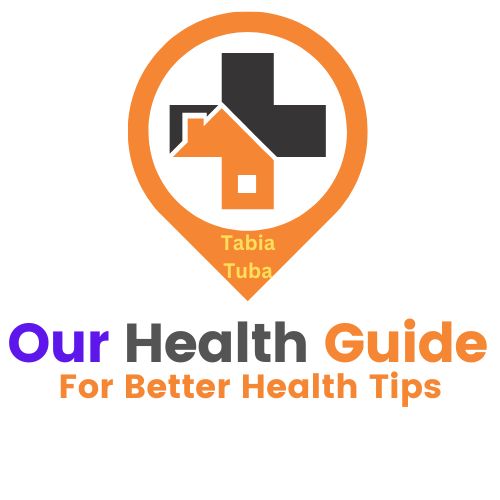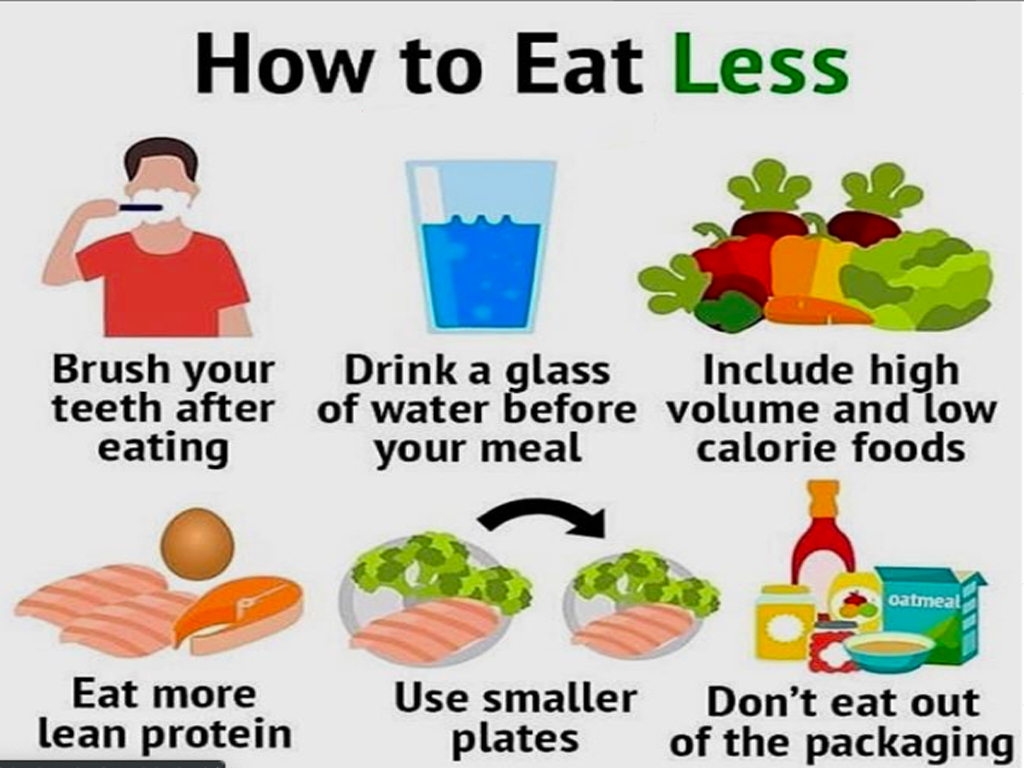How to Eat Less
Eating less can be achieved by adopting a combination of mindful eating practices, making smarter food choices, and developing healthier habits.
-
Portion Control
- Use smaller plates and bowls: Studies show that people tend to eat more when they have larger portions in front of them. A smaller plate can trick your mind into thinking you’re eating more.
- Pre-portion snacks: Instead of eating directly from a large bag or container, portion out small servings so you’re aware of how much you’re eating.
- Serve smaller portions: Put less food on your plate and avoid going back for seconds.
-
Eat More Protein and Fiber
- Increase protein: Foods high in protein (like lean meats, beans, eggs, and nuts) help you feel full longer, reducing the urge to snack.
- Add more fiber: Vegetables, fruits, legumes, and whole grains are fiber-rich and can keep you feeling satisfied for longer, which can reduce overeating.
-
Drink Water Before and During Meals
- Stay hydrated: Sometimes, thirst is mistaken for hunger. Drinking a glass of water before a meal can help prevent unnecessary snacking.
- Drink water during meals: Sipping water with your food can help you feel fuller and less likely to overeat. Its the best method to how to Eat Less .
-
Plan Your Meals
- Meal prep: Planning and preparing meals in advance can help you avoid impulsive eating decisions. This also allows you to control the portions and ingredients in your meals.
- Avoid skipping meals: Skipping meals can lead to overeating later due to excessive hunger. Eat regular, balanced meals throughout the day. Its another best method to how to Eat Less .
-
Reduce Emotional Eating
- Identify triggers: If you tend to eat when you’re stressed, bored, or upset, find healthier ways to cope with those emotions (like exercise, reading, or talking to someone).
- Avoid stress eating: Try to develop strategies to reduce stress, such as mindfulness techniques, yoga, or engaging in hobbies.
-
Choose Nutrient-Dense Foods
- Opt for whole foods: Whole, unprocessed foods like fruits, vegetables, lean meats, and whole grains are more filling and less calorie-dense compared to processed foods.
- Limit empty calories: Cut back on sugary snacks, processed foods, and high-calorie drinks that don’t offer much nutritional value but contribute to overeating.
-
Get Enough Sleep
- Sleep well: Lack of sleep can lead to hormonal imbalances that increase hunger and cravings. Aim for 7-9 hours of sleep each night to regulate your appetite.
-
Avoid Buying Junk Food
- Keep unhealthy snacks out of the house: If you don’t have easy access to unhealthy snacks, you’ll be less likely to indulge in them. Fill your kitchen with healthier options.
-
Eat till 80% full:
“Eat till 80% full” is a concept often associated with mindful eating or certain health practices like hara hachi bu—a Japanese phrase meaning “eat until you’re 80% full.” It suggests stopping eating before you’re completely full, leaving some room in your stomach. The idea behind this is to avoid overeating and give your body time to signal that it’s had enough food. The benefit of stopping at 80% full is that it may help prevent weight gain, improve digestion, and promote better overall health.
10. Change your emotional relationship with food:
Changing your emotional relationship with food helps you eat less by reducing emotional eating habits, such as eating out of stress, boredom, or comfort. When you stop relying on food for emotional relief, you can focus on eating when you’re truly hungry and stop when you’re satisfied, leading to healthier portion sizes and more mindful eating.
11. Avoid Liquid Calories:
“Avoid liquid calories” means reducing or eliminating calorie-rich drinks like sugary sodas, sweetened coffee or tea, alcoholic beverages, and fruit juices. These drinks often contain high amounts of sugar and empty calories without providing much nutritional value or satiety. By cutting back on liquid calories, you can reduce overall calorie intake and avoid consuming extra sugar, which can help with weight management and better overall health. Its important method how to Eat Less .
By combining these strategies and being consistent with them, you’ll be able to control your eating habits and reduce overeating in a sustainable way.

